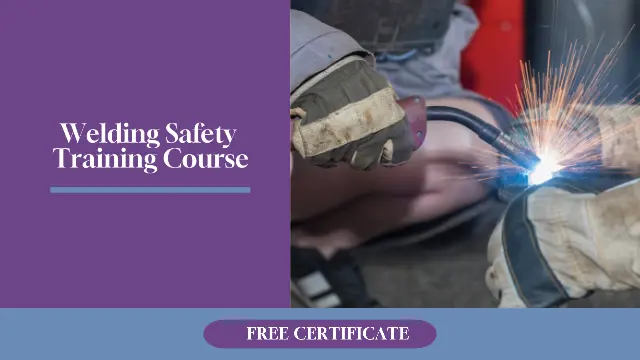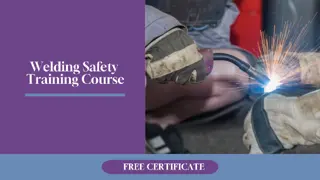
Welding Safety Training Course
Interactive Video Lessons | Free E-Certificate | Tutor Support | Lifetime Access | No Hidden Fees | CPD Accredited
METAVERSESKILLS
Summary
- Certification of Completion - Free
- Tutor is available to students
Add to basket or enquire
Overview
The "Welding Safety Training Course" is designed to provide participants with a comprehensive understanding of welding safety practices and procedures. This course aims to equip individuals with the knowledge and skills necessary to ensure a safe working environment while performing welding operations. Participants will learn about potential hazards, safety regulations, personal protective equipment (PPE), and best practices to prevent accidents and injuries during welding activities.
Certificates
Certification of Completion
Digital certificate - Included
Description
Module 1: Introduction to Welding Safety
- Importance of welding safety
- Overview of common welding hazards
- Understanding relevant safety regulations and standards
Module 2: Welding Equipment and Precautions
- Introduction to welding equipment and machinery
- Safety precautions for handling welding equipment
- Proper storage and maintenance of welding tools
Module 3: Personal Protective Equipment (PPE)
- Types of PPE used in welding operations
- Selecting and using appropriate PPE for different welding processes
- Inspection and care of PPE
Module 4: Fire Safety and Prevention
- Identifying fire hazards in welding environments
- Fire prevention techniques and safe practices
- Fire extinguisher types and usage
Module 5: Hazardous Substances and Ventilation
- Types of hazardous substances in welding fumes and gases
- Understanding ventilation systems and their importance
- Best practices for controlling and minimizing exposure to hazardous substances
Module 6: Welding Safety Practices
- Safe work area setup and maintenance
- Electrical safety precautions
- Welding in confined spaces
- Hot work safety procedures
Module 7: Emergency Preparedness
- Developing an emergency response plan
- First aid procedures for welding-related injuries
- Evacuation protocols and communication during emergencies
Who is this course for?
Upon completing the "Welding Safety Training Course," participants will be well-prepared to pursue a career in welding and related industries. Graduates of the course can explore various career paths, including:
- Welder: Perform welding operations using various techniques and materials in industries such as construction, manufacturing, automotive, and aerospace.
- Welding Inspector: Conduct inspections and quality control checks to ensure welding processes and finished welds meet industry standards and specifications.
- Welding Supervisor: Oversee a team of welders, ensuring compliance with safety procedures, coordinating workflow, and providing guidance on welding techniques and practices.
- Welding Engineer: Design and develop welding processes, conduct research and development for new welding technologies, and provide technical support for welding projects.
- Welding Technician: Assist in the setup and maintenance of welding equipment, perform basic welding tasks, and support welders in their day-to-day operations.
Requirements
No prior knowledge or experience required
Career path
Completing a Welding Safety Training Course opens career paths. Start as an assistant or safety monitor. Advance to certified welder or safety coordinator. Senior roles include welding supervisor or safety manager, ensuring safety and efficiency.
Questions and answers
Currently there are no Q&As for this course. Be the first to ask a question.
Reviews
Currently there are no reviews for this course. Be the first to leave a review.
Legal information
This course is advertised on reed.co.uk by the Course Provider, whose terms and conditions apply. Purchases are made directly from the Course Provider, and as such, content and materials are supplied by the Course Provider directly. Reed is acting as agent and not reseller in relation to this course. Reed's only responsibility is to facilitate your payment for the course. It is your responsibility to review and agree to the Course Provider's terms and conditions and satisfy yourself as to the suitability of the course you intend to purchase. Reed will not have any responsibility for the content of the course and/or associated materials.


